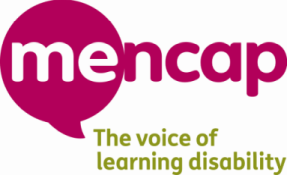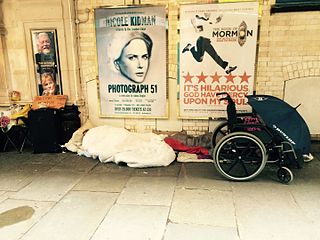Related Research Articles
Care in the Community is a British policy of deinstitutionalisation, treating and caring for physically and mentally disabled people in their homes rather than in an institution. Institutional care was the target of widespread criticism during the 1960s and 1970s, but it was not until 1983 that the government of Margaret Thatcher adopted a new policy of care after the Audit Commission published a report called 'Making a Reality of Community Care' which outlined the advantages of domiciliary care.

Islamic Relief Worldwide is a faith-inspired humanitarian and development agency which is working to support and empower the world's most vulnerable people.

Victor Olufemi Adebowale, Baron Adebowale, is the former Chief Executive of the social care enterprise Turning Point, current Chair of the NHS Confederation and was one of the first individuals to become a People's Peer.

The Royal Mencap Society is a charity based in the United Kingdom that works with people with learning disabilities. Its Charity Number is 222377.

Mind is a mental health charity in England and Wales. Founded in 1946 as the National Association for Mental Health (NAMH), it celebrated its 70th anniversary in 2016.

Dignity in Dying is a United Kingdom nationwide campaigning organisation. It is funded by voluntary contributions from members of the public, and as of December 2010, it claimed to have 25,000 actively subscribing supporters. The organisation declares it is independent of any political, religious or other affiliations, and has the stated primary aim of campaigning for individuals to have greater choice and more control over end-of-life decisions, so as to alleviate any suffering they may be undergoing as they near the end of their life.
St Andrew's Healthcare is a large independent charity based at St Andrew's Hospital in Northampton, which provides psychiatric services. It also has sites in Essex, Birmingham and Nottinghamshire. It runs specialist services for adolescents, men, women and older people with mental illness, learning disability, brain injury, autism and dementia and hosts the National Brain Injury Centre. It is a psychiatric hospital and service provider that caters for individuals requiring inpatient care and rehabilitation, and step-down housing.

Homelessness in the United Kingdom is measured and responded to in differing ways in England, Scotland, Wales and Northern Ireland but affects people living in every part of the UK's constituent countries.

United Response is a charity operating in England and Wales, providing a range of support and services for around 2,000 people with learning disabilities, mental health needs, or physical disabilities.

ARC Association for Real Change is a UK membership organisation, which supports providers of services to people with a learning disability.
In England, social care is defined as the provision of social work, personal care, protection or social support services to children or adults in need or at risk, or adults with needs arising from illness, disability, old age or poverty. The main legal definitions flow from the National Health Service and Community Care Act 1990, with other provisions covering disability and responsibilities to informal carers. That provision may have one or more of the following aims: to protect people who use care services from abuse or neglect, to prevent deterioration of or promote physical or mental health, to promote independence and social inclusion, to improve opportunities and life chances, to strengthen families and to protect human rights in relation to people's social needs.

The Association of Mental Health Providers (AMHP), known until May 2017 as Mental Health Providers Forum (MHPF), is a registered charity based in London and the representative body for voluntary and community sector mental health organisations in England and Wales, working nationally and regionally to influence practice and policy. It aims to improve the range and quality of mental health services by increasing the involvement of the voluntary sector in delivering them, working in partnership with the wider sector and government agencies. Specific projects include the promotion of innovation in the sector, evidencing best practice to achieve the best outcomes for individuals and supporting recovery.
The Big Society was a sociopolitical concept of the first 15 years of the 21st century, developed by the populist Steve Hilton, that sought to integrate free market economics with a conservative paternalist conception of the social contract that was influenced by the 1990s civic conservatism of David Willetts. The Big Society influenced the 2010 UK Conservative Party general election manifesto and the legislative programme of the Conservative–Liberal Democrat coalition agreement. The relevant policy areas were devolved in Northern Ireland, in Scotland and in Wales, to, respectively, the Northern Ireland Executive, the Scottish Government and the Welsh Government.
Revolving Doors is a charitable organisation in the United Kingdom which works across England and Wales. Through research, policy and campaigning work, the organisation aims to improve services for people with multiple needs who are in repeat contact with the criminal justice system.
The under-occupancy penalty results from a provision of the British Welfare Reform Act 2012 whereby tenants living in public housing with rooms deemed "spare" face a reduction in Housing Benefit, resulting in them being obliged to fund this reduction from their incomes or to face rent arrears and potential eviction by their landlord.
Section6(1) of the Equality Act 2010 defines disability as:
"A person has a disability for the purposes of the Act if he or she has a physical or mental impairment and the impairment has a substantial and long-term adverse effect on his or her ability to carry out normal day-to-day activities."
Mental health in the United Kingdom involves state, private and community sector intervention in mental health issues. One of the first countries to build asylums, the United Kingdom was also one of the first countries to turn away from them as the primary mode of treatment for the mentally ill. The 1960s onwards saw a shift towards Care in the Community, which is a form of deinstitutionalisation. The majority of mental health care is now provided by the National Health Service (NHS), assisted by the private and the voluntary sectors.
Hft, formerly known as the Home Farm Trust, is a British learning disability charity based in Bristol. It was established in 1962. The parents who established the charity bought Frocester Manor in Gloucestershire as a residential home for their children. The organisation runs small, person-centred residential care homes and supported living services.
The private provision of NHS services has been controversial since at least 1990. Keep Our NHS Public, NHS Support Federation and other groups have campaigned against the threat of privatisation, largely in England.
The Citizen Network Research, formerly the Centre for Welfare Reform is a Sheffield-based think tank which works globally on advancing citizenship for all. It was launched in 2009, changed its name in 2022, and has published a range of materials offering progressive innovations in welfare reform. It is not linked to any particular political party but is aligned with progressive politics in the UK and also works internationally. The Director and founder is Dr Simon Duffy.
References
- ↑ "Guidance on pay for sleep-in carers 'does not go far enough'". Third Sector. 9 November 2018. Retrieved 25 August 2019.
- ↑ Brindle, David (16 January 2019). "Hundreds of UK care workers threaten walkout over wage cuts". Guardian. Retrieved 25 August 2019.
- ↑ "Social Care Sector Condemns 'Unfit Proposals' To Reform Mental Capacity Laws". Rights Info. 11 February 2019. Retrieved 25 August 2019.
- ↑ "Stop the cuts that sap the life out of society". Guardian. 7 July 2019. Retrieved 25 August 2019.
- ↑ "Social care green paper delay is a disservice to older and disabled people". Charity Today. 13 March 2019. Retrieved 25 August 2019.
- ↑ "New report highlights untapped potential of assistive technology". Care Home Professional. 15 July 2019. Retrieved 25 August 2019.
- ↑ "'National scandal' sees hundreds of people detained in UK hospitals for more than 10 years". Homecare Insight. 9 December 2019. Retrieved 22 February 2020.